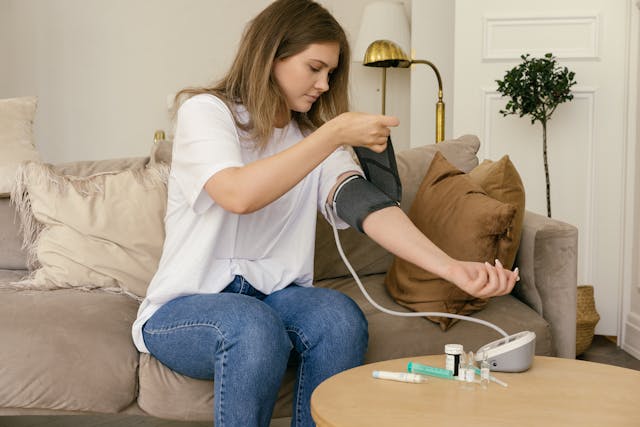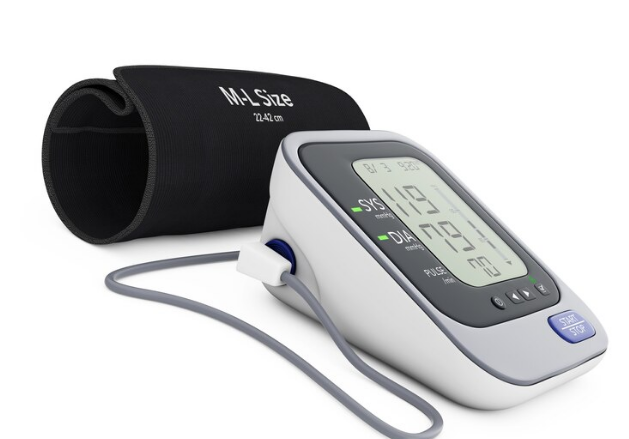When blood pressure measurements are noticeably lower than normal, it is called low blood pressure or hypotension. Although hypertension, or high blood pressure, is well known to be a health concern, low blood pressure can also result in many problems, especially if it falls rapidly or to very low levels. This article delves into the various causes of low blood pressure and provides a thorough overview of this condition.
Understanding Blood Pressure
The force that flowing blood applies to blood vessel walls is known as blood pressure. The systolic and diastolic pressures are the two parts of blood pressure measurement, which is given in millimeters of mercury (mmHg). The first number, the systolic pressure, indicates the pressure in the arteries during a heartbeat, while the second number, the diastolic pressure, indicates the pressure in the arteries in between heartbeats. Generally speaking, a normal blood pressure reading is 120/80 mmHg. The standard definition of hypotension is a measurement of less than 90/60 mmHg.

Causes Of Low Blood Pressure
Numerous factors can lead to hypotension. Causes of low blood pressure include:
1. Dehydration
When the body loses more fluids than it takes in, dehydration sets in, resulting in a decrease in blood volume. Lower blood pressure may be the outcome of this drop in blood volume. Dehydration can be brought on by vomiting, diarrhea, excessive perspiration, and not drinking enough fluids. Hypovolemic shock, a potentially fatal syndrome in which blood pressure falls dangerously low, can result from severe dehydration.
2. Heart Problems
Low blood pressure can be caused by several types of heart problems, including:
- Bradycardia: An unusually low heart rate might cause the heart to pump less blood, which lowers blood pressure.
- Heart Valve Issues: When the heart cannot pump blood effectively, the blood pressure is lowered. This is caused by malfunctioning heart valves.
- Heart Attack: A heart attack can cause low blood pressure by weakening the heart’s capacity to pump blood.
- Heart Failure: Blood pressure may decrease if the heart is unable to pump enough blood to meet the body’s requirements.
3. Endocrine Disorders
Endocrine disorders can cause hormonal imbalances that can make it hard to control blood pressure. Common endocrine causes of low blood pressure (hypotension) include:
- Adrenal insufficiency (Addison’s disease): The hormones that control blood pressure are produced by the adrenal glands. Low blood pressure results from the adrenal glands’ inadequate production of these hormones in Addison’s disease.
- Hypothyroidism: A thyroid that is not functioning at full capacity can slow down the heart rate and other body processes, which can lead to low blood pressure.
- Diabetes: Uncontrolled diabetes can harm blood pressure-regulating neurons, resulting in hypotension.
4. Severe Blood Loss
Severe blood loss from internal bleeding, trauma, or surgery can lower blood volume and cause a substantial reduction in blood pressure. Hypovolemic shock is the medical term for this situation, which is an emergency that needs to be treated right away.
5. Septicemia (Blood Infection)
Sepsis, also known as septicemia, is a serious infection that travels throughout the body through the blood. The infection can induce a sudden drop in blood pressure, resulting in septic shock. Life-threatening septic shock necessitates immediate medical care.
6. Anaphylaxis (Severe Allergic Reaction)
Anaphylaxis is a severe, life-threatening allergic reaction that causes a quick drop in blood pressure. Foods, insect bites, drugs, and latex are common causes. Anaphylaxis results in a sudden drop in blood pressure because the immune system releases substances that can widen and leak fluid from blood vessels.

7. Nutritional Deficiencies
Certain nutrients are essential for keeping blood pressure stable. Deficiencies in certain nutrients can cause hypotension.
- Vitamin B12 and Folate: For the body to produce red blood cells, two vitamins are necessary which are folate and vitamin B12. A deficiency can result in anemia, which can cause low blood pressure.
- Iron: Iron deficiency anemia causes a reduction in the amount of red blood cells, which can drop blood pressure.
8. Medications
Low blood pressure can be caused by a number of drugs, including:
- Diuretics: Often used to treat high blood pressure, diuretics increase urine production, which can cause dehydration and lower blood pressure.
- Beta-blockers: These drugs slow the heart rate, lowering blood pressure.
- Alpha-blockers: These medications, which are used to treat high blood pressure and prostate issues, can widen blood arteries, lowering blood pressure.
- Antidepressants: Certain antidepressants might produce hypotension, especially when standing up.
- Erectile Dysfunction Medications: These can help reduce blood pressure, especially when combined with nitrates.
9. Orthostatic Hypotension
Orthostatic hypotension, sometimes referred to as postural hypotension, is a condition in which standing up from a seated or laying position causes a considerable drop in blood pressure. This disorder is frequently brought on by the body’s autonomic nerve system’s incapacity to swiftly regulate blood pressure. Orthostatic hypotension can be brought on by heart issues, prolonged bed rest, dehydration, and some drugs.
10. Pregnancy
Because of hormonal changes and the enlargement of the circulatory system during pregnancy, blood pressure often drops, especially in the first and second trimesters. Although severely low blood pressure is normally not a reason for alarm, it should be monitored.
11. Prolonged Bed Rest
Low blood pressure can result from prolonged bed rest or immobility, which can lower blood volume and muscle tone. Patients who are bedridden or in hospitals should be especially concerned about this.
Conclusion
Hypotension, or low blood pressure, has several causes, including dehydration, cardiac problems, endocrine abnormalities, and adverse drug reactions. While many episodes of low blood pressure are minor and do not necessitate treatment, severe hypotension can lead to consequences, especially if it causes symptoms like dizziness, fainting, or shock. For low blood pressure to be effectively managed and treated, it is essential to understand its underlying cause. It is crucial to consult a doctor if you have low blood pressure symptoms in order to identify the cause and the best course of action.

FAQs About Low Blood Pressure
- What is considered low blood pressure?
- A blood pressure reading of less than 90/60 mmHg is commonly referred to as low blood pressure, or hypotension. Still, a person’s condition and symptoms may influence what’s considered low blood pressure.
- What typical signs and symptoms indicate low blood pressure?
- Dizziness, lightheadedness, fainting, blurred vision, nausea, exhaustion, and trouble concentrating are typical symptoms. Severe hypotension can result in shock, which is considered a medical emergency.
- Can low blood pressure be dangerous?
- Indeed, a rapid or large reduction in blood pressure can be harmful and induce fainting, organ damage, or shock. This is especially true if the decline is brought on by underlying health concerns. However, some people naturally have low blood pressure without any symptoms.
- What should I do if my low blood pressure causes me to feel lightheaded or faint?
- It’s crucial to sit or lie down as soon as you feel lightheaded or faint in order to avoid collapsing. To improve blood flow to your heart, elevate your legs. Get help if the symptoms don’t go away.
- Can low blood pressure result from dehydration?
- Yes, dehydration can cause a reduction in blood volume, resulting in low blood pressure. Keeping your blood pressure within normal range requires drinking enough of fluids, particularly during the summer or while you’re sick.
- What are the leading causes of low blood pressure?
- Among the causes are dehydration, cardiac problems, endocrine issues, severe bleeding, allergy, septicemia, certain drugs, and dietary deficits.
- Can a drop in blood pressure indicate a cardiac condition?
- Yes, low blood pressure can result from a number of cardiac disorders, including heart failure, bradycardia, heart valve issues, and heart attacks.
- How may low blood pressure be identified?
- A blood pressure measurement is used to diagnose low blood pressure. To find the underlying cause, other examinations including blood tests, ECGs, or echocardiograms might be carried out.
- Which lifestyle modifications can aid in the management of low blood pressure?
- A few lifestyle modifications are increasing water intake, eating small, frequent meals, avoiding abrupt posture changes, putting on compression stockings, and consuming less alcohol. Depending on what is causing your low blood pressure, your doctor could advise making certain adjustments.
- Are there any drugs available to treat hypotension?
- The cause determines the course of treatment. Sometimes doctors will prescribe drugs to raise blood pressure, including fludrocortisone or midodrine. But not every situation calls for medication; in certain circumstances, changing one’s way of living may be enough.
- Can a diet have an impact on low blood pressure?
- Indeed, dietary factors may have an impact on low blood pressure, especially if it results from a deficiency in one or more nutrients, such as iron, folate, or vitamin B12. Eating a nutritious, well-balanced diet is essential for preserving normal blood pressure.
- Is it usual for pregnant women to have low blood pressure?
- Yes, blood pressure does frequently drop during pregnancy, particularly in the first and second trimesters. Extremely low blood pressure during pregnancy should be closely watched by a healthcare professional, even though it is usually harmless.
- Can exercise cause low blood pressure?
- Particularly in those who already have low blood pressure, exercise can temporarily lower blood pressure. On the other hand, consistent exercise is usually good for cardiovascular health in general. When exercising, it’s critical to maintain proper hydration and refrain from abruptly shifting positions.
- When should I visit a physician if my blood pressure is low?
- If you suffer symptoms like confusion, dizziness, or fainting, or if your blood pressure drops suddenly and severely, you should visit a doctor. In addition, if low blood pressure is linked to underlying medical issues, it’s critical to consult a doctor.
- Can blood pressure be impacted by stress?
- Yes, blood pressure can be impacted by stress. Although it’s more frequently linked to high blood pressure, worry and anxiety can occasionally cause low blood pressure as well, especially if they cause lightheadedness or fainting.



